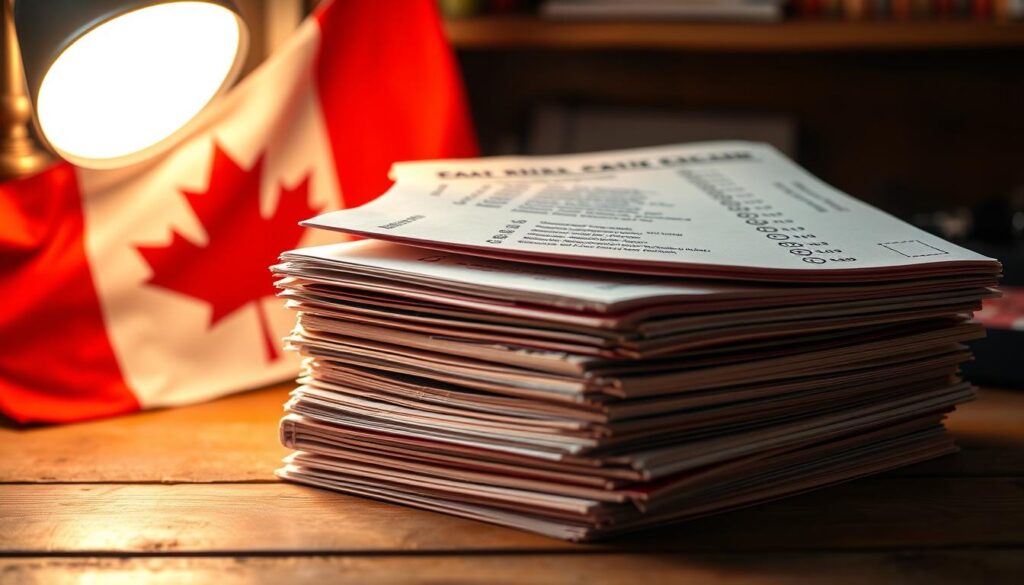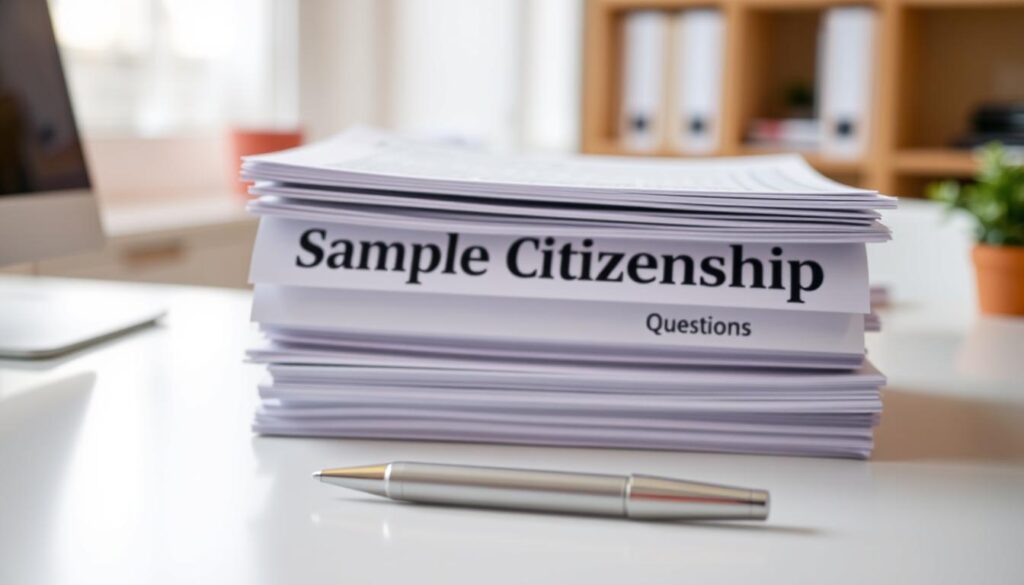Did you know that 1 in 4 applicants fail the official citizenship exam on their first attempt? Preparing with a reliable resource can make all the difference. This free practice tool mirrors the actual exam format, helping you gauge your readiness.
The test includes 20 multiple-choice and true-false questions, just like the real assessment. You’ll need a 75% score (15 correct answers) to pass. Topics cover history, government, Indigenous peoples, and more—essential knowledge for your journey.
For official updates, visit the Canada Visa Portal. Grab a pen and paper, and let’s get started!
Introduction to the Canadian Citizenship Practice Test
Becoming a citizen involves meeting specific criteria—let’s break them down. You’ll need to prove residency, language skills, and more. This section clarifies what’s required before you take the exam.
- Residency: Live in Canada for 3 out of 5 years.
- Language: Achieve CLB 4 in English or French.
- Age: Applicants must be 18–54 years old.
| Requirement | Details |
|---|---|
| Physical Presence | 1,095 days minimum |
| Language Proof | Test results or education records |
| Processing Time | Average 18 months |
Dual citizenship is permitted, but check your home country’s rules. Some nations don’t allow it.
Track your application via IRCC’s online portal. The exam can be taken in-person, online, or via Microsoft Teams.
Understanding the Canadian Citizenship Test
Mastering the exam requires knowing its structure and content—here’s what to expect. The assessment includes 20 questions, blending multiple-choice and true-false formats. You’ll answer them in 30 minutes, with a passing score of 75%.

Test Format and Structure
Questions are drawn from the Discover Canada guide. Here’s a quick breakdown:
- Types: 15 multiple-choice, 5 true-false.
- Time: 30 minutes total.
- Attempts: Three tries allowed.
Topics Covered in the Assessment
The exam tests your knowledge of Canada’s:
- Parliamentary system and government.
- History, including Indigenous contributions.
- Laws like the Charter of Rights.
| Retake Policy | Details |
|---|---|
| Attempts Allowed | 3 total |
| Waiting Period | 30 days between retakes |
| Language Options | English or French |
Regional questions may appear (e.g., provincial symbols). Study broadly to ensure success.
How to Use This Free Canadian Citizenship Practice Test
Preparing for the assessment? Follow these steps to simulate real exam conditions. This tool mirrors the official format, helping you build confidence and accuracy.

Step-by-Step Guide
1. Set a timer for 30 minutes. This replicates the actual test’s time pressure.
2. Use answer sheets to track progress. Print them for repeat attempts.
3. Review wrong answers with the Discover Canada study guide. Focus on weak areas.
“Consistent, timed drills improve recall by 40% compared to untimed study.”
Additional Tips
- Research your province’s representatives (MPs/MLAs)—questions may vary regionally.
- Check the IRCC website for updates on exam policies or content changes.
| Region | Library Contact |
|---|---|
| Ontario | Toronto Public Library |
| Quebec | Bibliothèque de Montréal |
| British Columbia | Vancouver Public Library |
Need extra help? Many libraries offer free workshops or study guide rentals. Local resources can provide tailored support.
Sample Questions from the Canadian Citizenship Test
Test your knowledge with these realistic questions from past exams. Each category reflects core topics you’ll encounter. Review answers and explanations to spot gaps in your preparation.

History and Geography
Expect questions about key events and landmarks. For example:
- Which Indigenous group signed Treaty No. 7 in 1877? (Blackfoot Confederacy)
- When did the Battle of Vimy Ridge occur? (1917)
Trick questions may ask about provincial symbols. The beaver is a national emblem, while the Crown represents the monarchy.
Rights and Responsibilities
This section covers legal freedoms and duties. Notable topics include:
- Mobility rights: Canadians can live/work anywhere in the country.
- Jury duty is mandatory unless exempted by law.
“Habeus Corpus ensures unlawful detention can be challenged in court.”
Government and Laws
Questions often focus on structures and foundational documents:
| Topic | Key Fact |
|---|---|
| Supreme Court | 9 judges appointed by the Governor General |
| Quebec Act (1774) | Protected French civil law and religion |
| Charter of Rights | Part of the Constitution Act, 1982 |
Remember, privileges like voting come with responsibilities. Paying taxes and obeying laws are part of being a citizen.
Scoring Your Canadian Citizenship Practice Test
Understanding your results is key to improving your knowledge. Each correct answer earns 1 point, with 15/20 needed to pass. Review your test results to spot patterns—are you struggling with history or government topics?

If You Passed (15+ Correct)
- Celebrate, but keep reviewing. The official exam may include new questions.
- Prepare for the ceremony: practice the Oath of Citizenship and gather required documents.
If You Scored Below 15
Don’t worry—adjust your preparation strategy:
- Analyze missed questions using the Discover Canada guide.
- Focus study sessions on weak areas (e.g., Indigenous history or laws).
- Retake the practice test weekly to track progress.
“Candidates who review incorrect answers improve retake scores by 30% on average.”
Next Steps
After the official exam, you may face an interview or hearing. Officers verify language skills and residency details. Track your category performance—this helps prioritize study time.
| Category | Improvement Tip |
|---|---|
| Government | Memorize parliamentary roles |
| Rights | Highlight Charter sections |
| History | Create timelines for key events |
Resources for Further Preparation
Boost your readiness with these essential study tools. Whether you prefer free materials or premium options, curated resources can sharpen your knowledge gaps.

Official Study Guide: Discover Canada
The Discover Canada handbook is your primary reference. Its chapters cover:
- History: Indigenous contributions, Confederation, and modern milestones.
- Government: Parliamentary roles, elections, and the judicial system.
- Symbols: Provincial flags, national emblems, and cultural heritage.
Print a copy for offline study or bookmark the digital version on the Canada Visa Portal.
Additional Practice Tests and Tools
Compare these options to reinforce weak areas:
| Resource | Features | Cost |
|---|---|---|
| Baseline Pack | 120 questions + answer key | Free |
| Premium Bundle | 700 questions, timed drills | $14.99–$44.99 |
For personalized help, consider a consultation with Cohen Immigration Law Firm. They clarify complex topics like residency proofs or retake policies.
“Category-specific drills improve accuracy by 22% compared to general study.”
Prioritize printable tests for flexible preparation. Libraries often lend study guides or host workshops—check local listings.
Next Steps After Taking the Practice Test
Now that you’ve completed the practice assessment, what comes next? Your results determine whether you’re ready for the official evaluation or need focused study. Here’s how to proceed.
If You Passed
A strong score means it’s time to prepare for the final steps. Follow this checklist:
- Submit your application within 8 weeks. Include proof of language skills and residence history.
- Attend the ceremony. New citizens recite the Oath and receive certificates. Dress formally and bring ID.
- Track processing time via the IRCC portal. Delays may occur during peak periods.
If You Need More Practice
Scored below 75%? Target weak areas with these strategies:
- Retake the test after 30 days. Focus on missed questions from history or government sections.
- Join study groups. Group applications often share resources like flashcards or timelines.
- Request a judicial review if your official exam fails twice. Gather evidence of preparation efforts.
“Applicants who analyze errors improve retake scores by 35%.”
| Document | Purpose |
|---|---|
| Passport Copies | Verify travel/residence |
| Language Proof | CLB 4 or higher |
| Fee Receipt | Confirm payment |
Keep language skills sharp by reading government websites or listening to news broadcasts. Consistency is key.
Conclusion
With 90% success rates for prepared applicants, your effort makes all the difference. Use tools like the Discover Canada guide and timed drills to sharpen your knowledge.
Remember, dual status rules vary by country—research implications beforehand. Automatic revocation may apply for fraud or misrepresentation.
Struggling? Focus on weak areas like history or government structures. Aim for 15+ correct answers to pass. Your commitment to this journey matters—celebrate every milestone!



